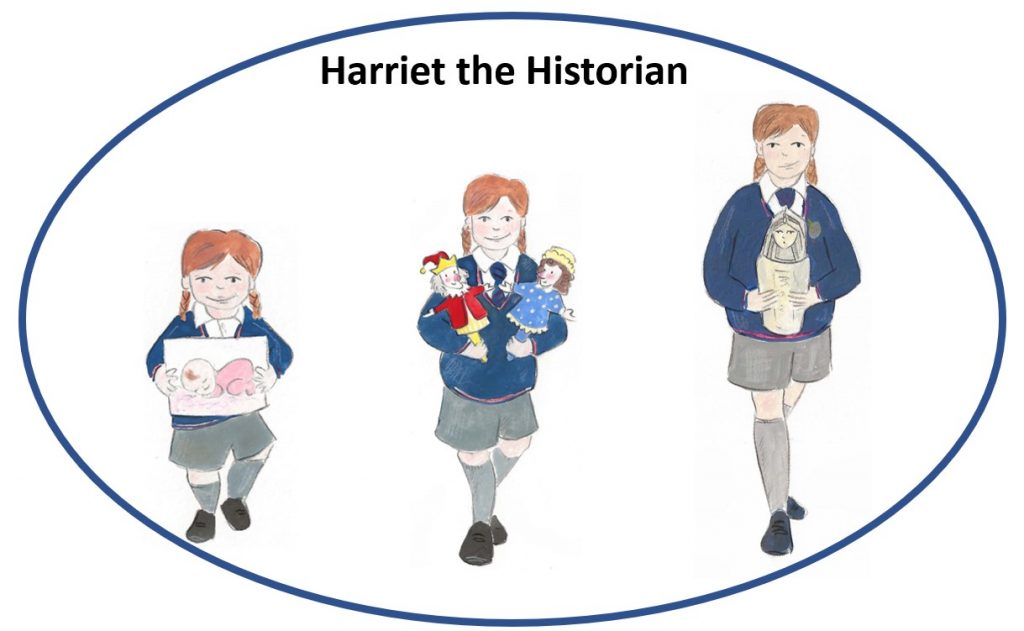
Intent: This is what we want for your child.
At Barley Fields Primary, we are proud to offer a high quality, bespoke History curriculum which aims to inspire and enthuse children to act and think like confident and competent historians. We hope to instil a pure love of learning about the past, how and why things happened. We want children to make sense of who we are in the present including an awareness of differing cultures and values which links directly with our ethos as a Gold Rights Respecting School.
We aim to foster a deep understanding of local history and to help children understand how it fits into the bigger historical picture. We strive for children to be excited and curious by evidence and artefacts in order to make inferences, ask questions and explore outcomes.
By the end of their journey at Barley Fields, we want children to have built up a wealth of historical knowledge and vocabulary in order to be critical thinkers, to form coherent explanations and to make links between different historical periods.
Implementation: This is what it will look like in the classroom
Our children follow a carefully structured History curriculum which has been designed to ensure children know more, remember more and can do more as they progress through our school. Our curriculum is based on the following strands of learning:
- Historical Knowledge
- Chronological Understanding
- Historical Enquiry
- Historical Interpretation
Our approach to teaching history starts in Early Years where children have the opportunity to talk about the past and present, develop an understanding of similarities and differences between then and now and draw on their own experiences and those of people around them. Moving into KS1 and 2, the History curriculum is based upon a careful and considered balance of skills and content. History units have been ordered with a clear rationale and content is covered and linked together through four golden threads (‘Civilisation’, ‘Invasion and Settlement’, ‘Power’, and ‘Legacy’) to help children form a clearer understanding of the past using carefully crafted enquiry questions. As a result, the children gain a greater understanding of history as a subject discipline. Every unit is underpinned by chronology. Both the overall narrative of history and internal narrative of a lifetime, event or full period are vital to piece together the complex and intertwining history that we teach.
History is taught in blocks of lessons to ensure children have opportunities for a sustained period of study and have time to embed and enhance their learning. Detailed schemes of learning support teaching, ensure continuity and carefully plan for progression and depth. These schemes are underpinned by appropriate teaching pedagogy for effective quality first teaching allowing for our school-wide best practice of adaptive teaching. Teaching and learning in History is designed to be practical and hands on; to encourage children to question and investigate for themselves and to provide them with access to high quality resources and artefacts, IT and reference materials to facilitate their learning. Our curriculum also incorporates a range of opportunities to enrich children’s learning experiences through fields trips, themed days, loaned artefacts and guest speakers.
We are proud to offer a curriculum informed by the latest research and which undergoes regular reviews and updates to ensure its relevance and effectiveness. We have worked with the EEF and the National College on adaptive teaching in the classroom which underpins all our teaching practice and pedagogy.
Our curriculum characters have been designed to represent the curriculum end points as children progress through school. Our children are regularly exposed to the core skills and knowledge needed to develop as a historian with the use of the school curriculum character – Harriet the Historian. This character is regularly used to encourage children to reflect on the key skills and concept areas of History.

Impact: This is what it will mean for our children.
We are proud that the impact of the history curriculum at Barley Fields helps children understand their place in the world and the long story of human development.
Our history curriculum and our teaching and learning pedagogy leads to children who:
- have secure knowledge and understanding of people, events and contexts from the historical periods covered.
- demonstrate the ability to think critically about history and communicate their ideas confidently.
- have a passion for history and an enthusiastic engagement in learning, which develops their sense of curiosity about the past and their understanding of how and why people interpret the past in different ways.
- show an ability to consistently support, evaluate and challenge their own and others’ views using detail, appropriate and accurate historical evidence derived from a range of sources.
- have the ability to think, reflect, debate, discuss and evaluate the past, forming and refining questions and lines of enquiry.
- display a respect for historical evidence and the ability to make robust and critical use of it to support their explanations and judgements.
- demonstrate a desire to embrace challenging activities, including opportunities to undertake high-quality research across a range of topics.
In addition, we measure the impact of our curriculum through the following methods:
- A celebration of learning which demonstrates progression across the school (Curriculum Floor book);
- Internal monitoring strategies by SLT and the History Team
- Pupil discussions about their learning (Pupil Voice);
We are very proud of our children’s attainment and progress in History across the primary phase. We continually observe and formatively assess children against curriculum end points using SONAR and use this information to plan their next steps in their learning and to challenge and consolidate their skills. Our children leave Barley Fields Primary with a rich and broad set of historical skills and we are confident that they will have developed a love and curiosity about the past and an understanding of how it shapes our future.
